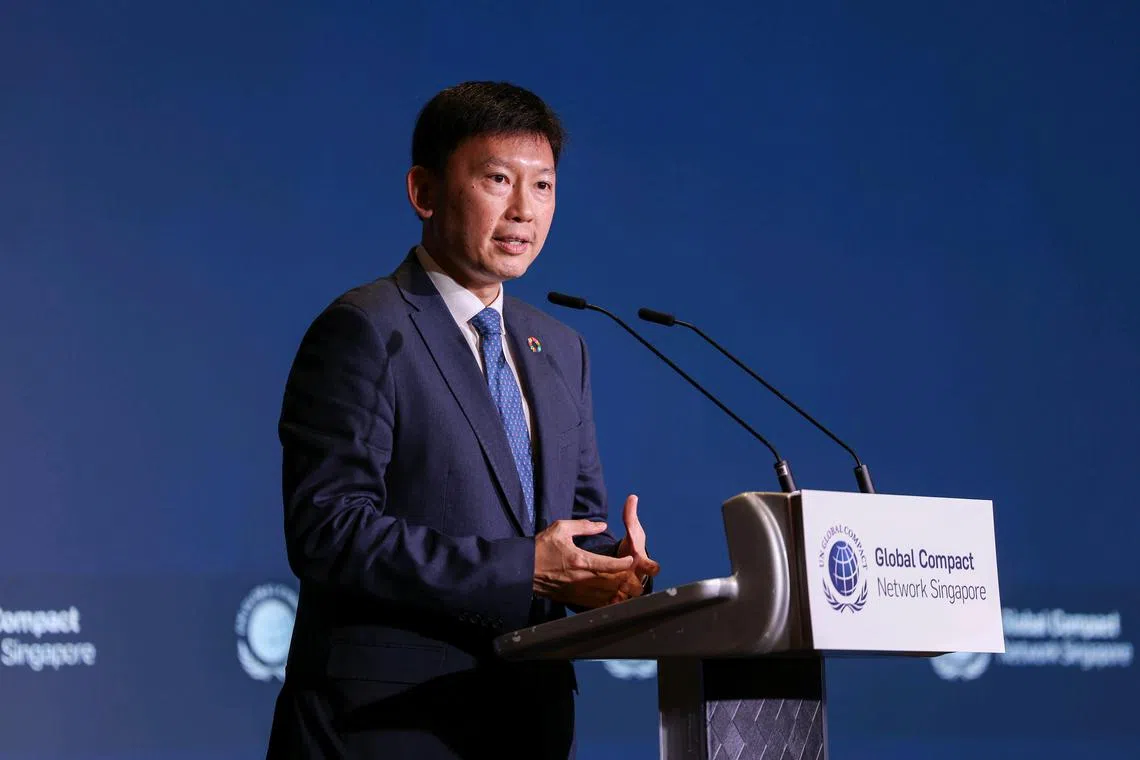Singapore SMEs to get more targeted help to go green
Sign up now: Get ST's newsletters delivered to your inbox

Transport Minister Chee Hong Tat said a survey found SMEs further along in decarbonisation journeys were 1½ to two times more likely to realise benefits.
ST PHOTO: BRIAN TEO
Follow topic:
SINGAPORE – Around 1,000 small and medium-sized companies (SMEs) here will get targeted, sector-specific help to go green in the next five years.
They will also get to use an artificial intelligence (AI) tool that helps them assess their carbon emissions since many small firms do not have a dedicated sustainability officer to generate such reports for them.
Called the SME sectoral net zero transition programme, the initiative will also match companies with partners for funding and provide them with green solutions that meet their needs.
The programme was announced by Transport Minister Chee Hong Tat at the UN Global Compact Network Singapore Summit on Oct 3. It is a joint effort by the Singapore Business Federation (SBF) and leading management consulting firm Bain & Co.
They have already conducted a pilot project with 21 food manufacturers from July to August and helped 80 per cent of them to establish their emissions baselines for the first time.
Mr Chee, who is also Second Minister for Finance, said: “I am heartened to hear of the pilot’s success and we are now going to expand this to support more SMEs in food manufacturing, and later on to scale up to other sectors.”
He noted that a new survey by the SBF and Bain found that SMEs further along in their decarbonisation journeys were 1½ to two times more likely to realise benefits, from achieving cost savings to attracting new customers.
For example, People Bee Hoon Factory was able to reduce electricity costs by 30 per cent by installing solar panels, Mr Chee said. The company also optimised its washing process and used thinner packaging material, resulting in a 50 per cent reduction in water consumption.
Craft brewery Brewerkz also participated in the pilot. Its managing director Tan Wee Tuck said: “The programme answered all the questions that we had about decarbonisation but were too afraid – or too busy, or too apathetic – to ask. It should be basic education for all business owners, just as knowing how to read a profit and loss statement.”
SBF chief executive officer Kok Ping Soon noted that only one-third of SMEs have made significant decarbonisation progress,
He said the programme will give SMEs ongoing advisory support from experts and guide them in navigating changing regulations, helping them to meet their decarbonisation goals.
Mr Gerry Mattios, co-director of the Global Sustainability Innovation Centre at Bain, added that SMEs are the backbone of Singapore’s economy, and are also significant contributors to greenhouse gas emissions.
“The decarbonisation pathway for SMEs is fraught with challenges, from financial constraints and limited capability to the complexity of integrating sustainable practices into existing business models that perhaps have different sets of priorities,” he said.
“Yet, it is within these challenges that we find immense opportunities.”
The SBF and Bain survey also found that the top three challenges faced by SMEs were a lack of awareness, in-house capability and financial support. Nearly 500 SMEs were surveyed across more than 20 sectors in Singapore.
Hence, SBF and Bain developed a unique AI tool to help SMEs make sector-specific assessments such as identifying their emission sources and creating “chief sustainability officer-quality” sector-specific decarbonisation strategies with minimal expertise and effort.
Mr Chee said: “New technologies like AI can also be a powerful enabler to unlock the benefits of decarbonisation and tackle challenges in areas like manpower and cost.” He noted that all this is part of preparing businesses for a low-carbon future, especially as Singapore has set a net-zero emissions target by 2050.
Mr Chee outlined three ways to achieve the global green transition. One is in leveraging technology.
“Businesses that adopt sustainable technologies, such as energy-efficient equipment and carbon accounting software, reap more than just environmental benefits. They can reduce costs and sharpen their competitive edge,” he said.
The second way is through talent. Firms can tap Singapore’s growing pool of green talent, and take steps to integrate green skills into roles that are not traditionally green, said Mr Chee.
Lastly, he noted that balancing trade-offs is important. “In the long run, a prosperous global economy must be an environmentally sustainable one,” he said.
“We must ensure our businesses are resilient and can compete and thrive as we move in tandem with global developments in sustainability.”
Mr Chee added that the key to aligning planet and profit goals lies in Singapore’s ability to harness technology and talent, and pursue green growth sustainably.
At the summit, the UN Global Compact Network Singapore also launched a web-based solution designed to streamline carbon emissions tracking and reporting for Singaporean businesses, called the digital carbon emission recording tool.
Dr Bicky Bhangu, president of the UN Global Compact Network Singapore, added: “We must work to level the playing field, ensuring businesses of all sizes can compete, innovate and thrive.”


